This is the first part of the Appendix of my 2004 collection Essential Cinema: On the Necessity of Film Canons. — J.R.
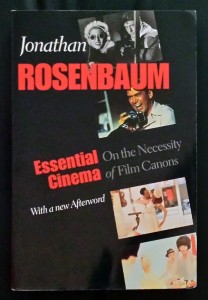
1000 Favorites (A Personal Canon), Part 1
The criteria I’ve used for inclusion on this list are pleasure and edification; I haven’t factored in any sense of historical importance that might exist independently of these factors. I’ve incorporated shorts as well as features, both animation and live-action, and videos as well as some works made for television, but not anything made for a TV series.
Broadly speaking, this list would comprise what I’d want to have on a desert island were it not for the fact that I’d want to bring along many other things that I haven’t already seen — including some of my more conspicuous omissions. No one who claims to have seen all possible candidates for the greatest films ever made could possibly be telling the truth, even in relation to a single year, and many of the exclusions here are things I haven’t yet caught up with. Many others are absent simply because I don’t value them as much as those I’ve included, and the most obvious limitation of this list is that it won’t be apparent in most cases whether I’ve excluded something because I haven’t seen it or because I don’t rank it highly enough. Read more
From the Chicago Reader (June 28, 1996). This essay subsequently grew into a book, commissioned by Rob White for the BFI Modern Classics, that came out in 2000, proved to be one of my most popular, and went into a second edition; a French edition is also available (2005), translated by Louis Malle’s daughter Justine, as well as a Czech edition and even an unauthorized Farsi one. — J.R.
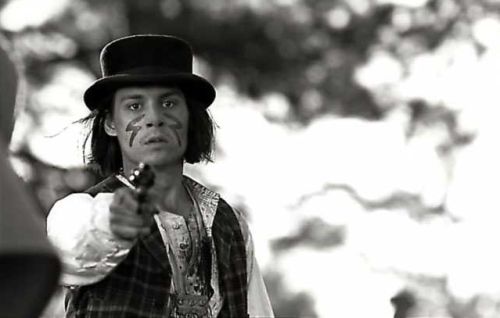
Dead Man
Rating **** Masterpiece
Directed and written
by Jim Jarmusch
With Johnny Depp, Gary Farmer, Lance Henriksen, Michael Wincott, Eugene Byrd, Mili Avital, Gabriel Byrne, John Hurt, Iggy Pop, Billy Bob Thornton, Jared Harris, Jimmie Ray Weeks, Mark Bringelson, Michelle Thrush, Alfred Molina, Robert Mitchum, and Crispin Glover.
When we speak of “seriousness” in fiction ultimately we are talking about an attitude toward death. — Thomas Pynchon
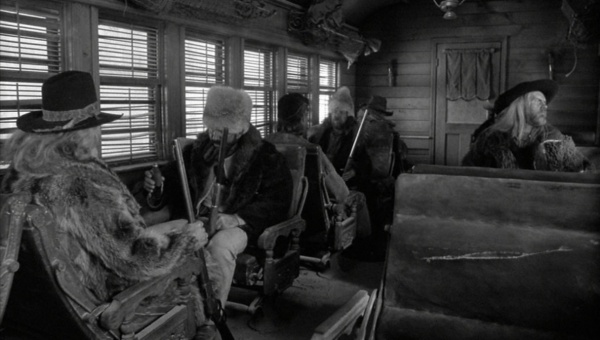
Jim Jarmusch’s Dead Man, a disturbing, mysterious black-and-white western, opens with someone named William Blake (Johnny Depp), a recently orphaned accountant from Cleveland, traveling west on a train with the promise of a job at a metal works in a town called Machine. He keeps dozing off and waking to new sets of fellow passengers, including several who fire their guns out the windows at a herd of buffalo. Read more
From the Chicago Reader (May 1, 2001). — J.R.
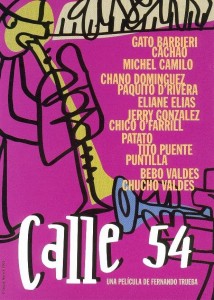
This no-nonsense documentary (2000) by the Spanish director Fernando Trueba (an Oscar winner for Belle Epoque) is a welcome primer on Latin jazz, an expansive genre that can range from a Dizzy Gillespie big-band arrangement to a Charlie Haden ballad. If my eyes aren’t deceiving me, the minimal exterior footage of musicians, shot in the U.S., Cuba, Puerto Rico, and Sweden, is digital video while the much slicker footage in simple studio settings is on celluloid — an appropriate combination, even if there’s a bit too much restless MTV-like cutting and angle changing. Much more importantly, Trueba’s commentaries are brief and to the point, and are never delivered over the music. A celebration of visual as well as aural delights, the film amply demonstrates how playing certain percussive instruments — conga drums, vibes, even piano — is much like dancing (though Trueba also provides actual dancing to go with Chano Dominguez’s jazz-flamenco fusions near the beginning and some Afro-Cuban drumming near the end). Apart from the percussiveness, the music is extremely varied, running the gamut from Eliane Elias’s lyrical piano to Gato Barbieri’s gruff but tender tenor sax to Chico O’Farrill’s wonderful big-band scoring; among the many other featured players are Paquito d’Rivera, Jerry Gonzalez and the Fort Apache Band, Tito Puente, Chucho Valdes, and a couple of the latter’s relatives. Read more
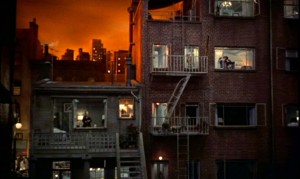
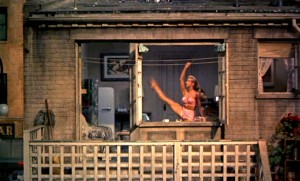
Perhaps Alfred Hitchcock’s greatest movie (1954). James Stewart plays a news photographer trapped in his Greenwich Village flat by a broken leg. Out of boredom he starts following the stories of his neighbors across the courtyard, all of which represent variations on the romantic issues of his own relationship with a former model (Grace Kelly) who’s trying to goad him into marriage. When he deduces that one of his neighbors (Raymond Burr) may have murdered his invalid wife, he moves into high gear as an amateur sleuth. Reader critic Dave Kehr called this the most densely allegorical of Alfred Hitchcock’s masterpieces, moving from psychology to morality to formal concerns and finally to the theological. It is also Hitchcock’s most innovative film in terms of narrative technique, discarding a linear story line in favor of thematically related incidents, linked only by the powerful sense of real time created by the lighting effects and the revolutionary ambient soundtrack. With Wendell Corey and Thelma Ritter at her very best. 112 min. (JR)

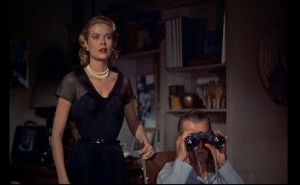 Read more
Read more








